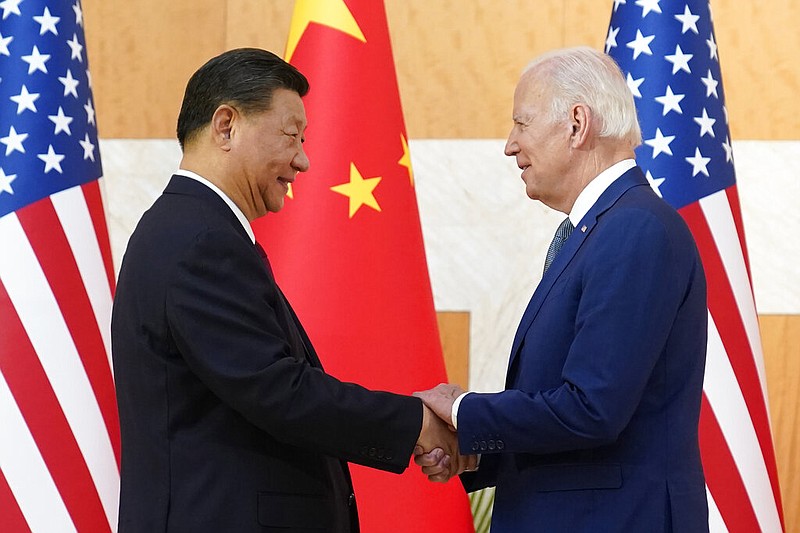By SEUNG MIN KIM and ZEKE MILLER
Associated Press
NUSA DUA, Indonesia (AP) -- President Joe Biden objected directly to China's "coercive and increasingly aggressive actions" toward Taiwan during the first in-person meeting of his presidency with Xi Jinping, as the two superpower leaders aimed on Monday to "manage" their differences in the competition for global influence.
The nearly three-hour meeting was the highlight of Biden's weeklong, round-the-world trip to the Middle East and Asia, and came at a critical juncture for the two countries amid increasing economic and security tensions. Speaking at a news conference afterward, Biden said that when it comes to China, the U.S. would "compete vigorously, but I'm not looking for conflict."
Biden reiterated U.S. support for its longstanding "One China" policy, which recognizes the government in Beijing -- while allowing for informal American relations and defense ties with Taipei, and "strategic ambiguity" over whether the U.S. would respond militarily if the island were attacked. He also said that despite China's recent saber rattling, he does not believe "there's any imminent attempt on the part of China to invade Taiwan."
Xi, according to the Chinese government's account of the meeting, "stressed that the Taiwan question is at the very core of China's core interests, the bedrock of the political foundation of China-U.S. relations, and the first red line that must not be crossed in China-U.S. relations."
Biden said he and Xi also discussed Russia's aggression against Ukraine and "reaffirmed our shared belief" that the use or even the threat of nuclear weapons is "totally unacceptable." That was a reference to Moscow's thinly veiled threats to use atomic weapons as its nearly nine-month invasion of Ukraine has faltered.
Chinese officials have largely refrained from public criticism of Russia's war, although Beijing has avoided direct support of the Russians, such as supplying arms.
While there were no watershed breakthroughs, the Biden-Xi meeting brought each side long-sought, if modest, gains. In addition to the shared condemnation of Russian nuclear threats, Biden appeared to secure from Xi the resumption of lower-level cooperation from China on a range of shared global challenges. Meanwhile, Xi, who has aimed to establish China as a geopolitical peer of the U.S., got symbolic home turf for the meeting as well as Biden's forceful One China policy commitment.
"As the leaders of our two nations, we share responsibility, in my view, to show that China and the United States can manage our differences, prevent competition from becoming anything ever near conflict, and to find ways to work together on urgent global issues that require our mutual cooperation," Biden said to open the meeting.
Xi called on Biden to "chart the right course" and "elevate the relationship" between China and the U.S. He said he wanted a "candid and in-depth exchange of views."
Taiwan has emerged as one of the most contentious issues. Multiple times in his presidency, Biden has said the U.S. would defend the island -- which China has eyed for eventual unification -- in case of a Beijing-led invasion. But administration officials have stressed each time that the U.S. China policy has not changed.
In the meeting, Biden said China's economic practices "harm American workers and families, and workers and families around the world," the White House said.
The meeting came just weeks after the Biden administration blocked exports of advanced computer chips to China -- a national security move that bolsters U.S. competition against Beijing.
Xi's government said he condemned such moves, saying, "Starting a trade war or a technology war, building walls and barriers, and pushing for decoupling and severing supply chains run counter to the principles of market economy and undermine international trade rules."
Although the two men have held five phone or video calls during Biden's presidency, White House officials said those encounters were no substitute for an in-person meeting. They said sitting down with Xi was all the more important after the Chinese leader strengthened his grip on power with a third term and because lower-level Chinese officials have been unable or unwilling to speak for their leader.
Biden said Xi was as he's always been.
"I didn't find him more confrontational or more conciliatory," Biden said. "I found him the way he's always been, direct and straightforward."
